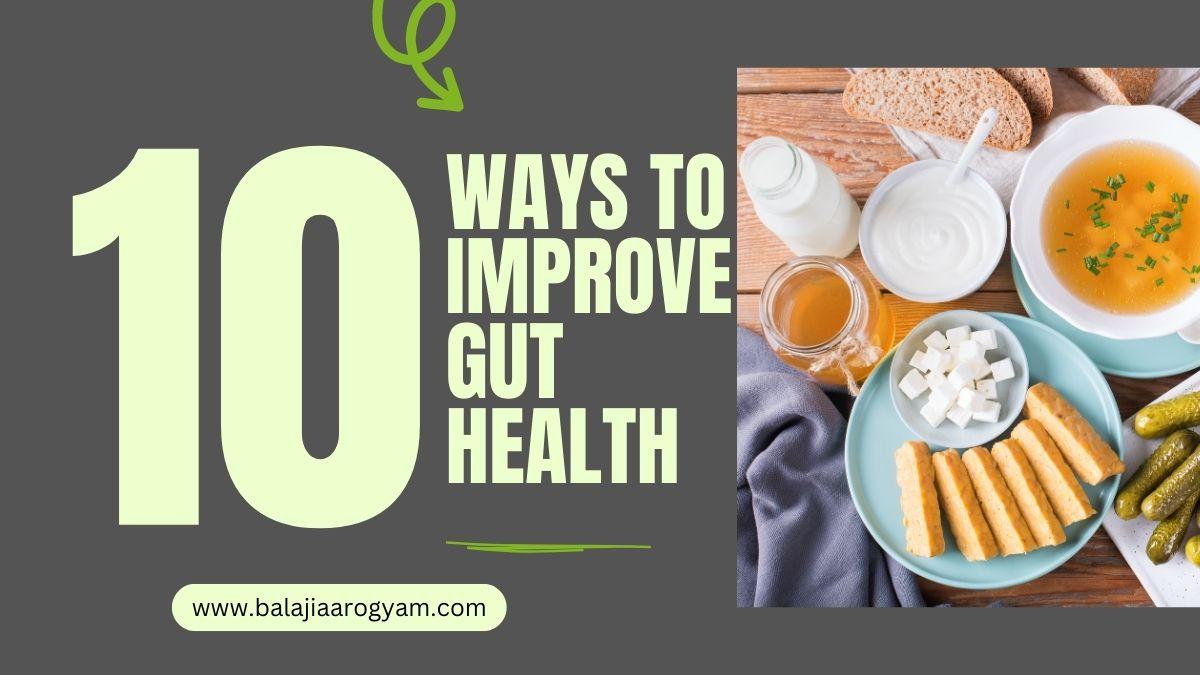10 ways to improve gut health

The gut, also known as the digestive tract, is an essential part of the body that plays a vital role in overall health and well-being. It is responsible for breaking down food, absorbing nutrients, and eliminating waste products. Poor gut health can lead to various health problems, including bloating, constipation, diarrhea, and even chronic diseases such as inflammatory bowel disease. Therefore, it's important to take care of your gut health. Here are ten ways to improve gut health:
-
Eat a balanced diet: One of the most important things you can do for your gut health is to eat a balanced diet. Include a variety of foods such as fruits, vegetables, whole grains, legumes, nuts, and seeds in your diet to ensure that you are getting a wide range of nutrients. These foods also contain fiber, which is important for maintaining healthy digestion and preventing constipation.
-
Eat fermented foods: Fermented foods such as yogurt, kefir, kimchi, sauerkraut, and kombucha contain beneficial bacteria that can improve gut health. These foods contain probiotics, which are live bacteria that can help to restore the balance of good bacteria in the gut.
-
Stay hydrated: Drinking plenty of water helps to keep your digestive system functioning properly. Water helps to soften stools and prevent constipation, and it also helps to flush out waste products from the body.
-
Reduce stress: Stress can negatively impact gut health, so practicing stress management techniques such as yoga, meditation, or deep breathing can help. These techniques can help to reduce stress and improve gut health.
-
Exercise regularly: Regular exercise can help to promote healthy digestion and reduce inflammation in the gut. Exercise can also help to reduce stress and improve overall health.
-
Get enough sleep: Getting enough sleep is important for overall health, including gut health. Lack of sleep can disrupt the balance of good bacteria in the gut and lead to digestive problems.
-
Limit intake of processed foods: Processed foods are often high in sugar, salt, and unhealthy fats, which can negatively impact gut health. Eating a diet high in processed foods can also lead to inflammation in the gut, which can cause digestive problems.
-
Avoid smoking and excessive alcohol consumption: Smoking and excessive alcohol consumption can damage the gut lining and negatively impact gut health. These habits can also increase the risk of developing digestive problems and chronic diseases.
-
Consider taking a probiotic supplement: Probiotics are live bacteria that can help to improve gut health. If you don't eat fermented foods regularly, taking a probiotic supplement can help to restore the balance of good bacteria in the gut.
-
Consult with a healthcare professional: If you have ongoing digestive issues, it's important to consult with a healthcare professional to rule out any underlying health conditions and get personalized advice on how to improve your gut health. Your doctor may recommend certain dietary changes, medications, or other treatments to improve gut health.
In conclusion
Taking care of your gut health is essential for overall health and well-being. Eating a balanced diet, including fermented foods, staying hydrated, managing stress, exercising regularly, getting enough sleep, limiting intake of processed foods, avoiding smoking and excessive alcohol consumption, taking a probiotic supplement, and consulting with a healthcare professional are all ways to improve gut health. By incorporating these practices into your daily life, you can help to promote healthy digestion, prevent digestive problems, and maintain overall health.
- Art
- Causes
- Crafts
- Dance
- Drinks
- Film
- Fitness
- Food
- Spiele
- Gardening
- Health
- Startseite
- Literature
- Music
- Networking
- Andere
- Party
- Religion
- Shopping
- Sports
- Theater
- Wellness
- IT, Cloud, Software and Technology


